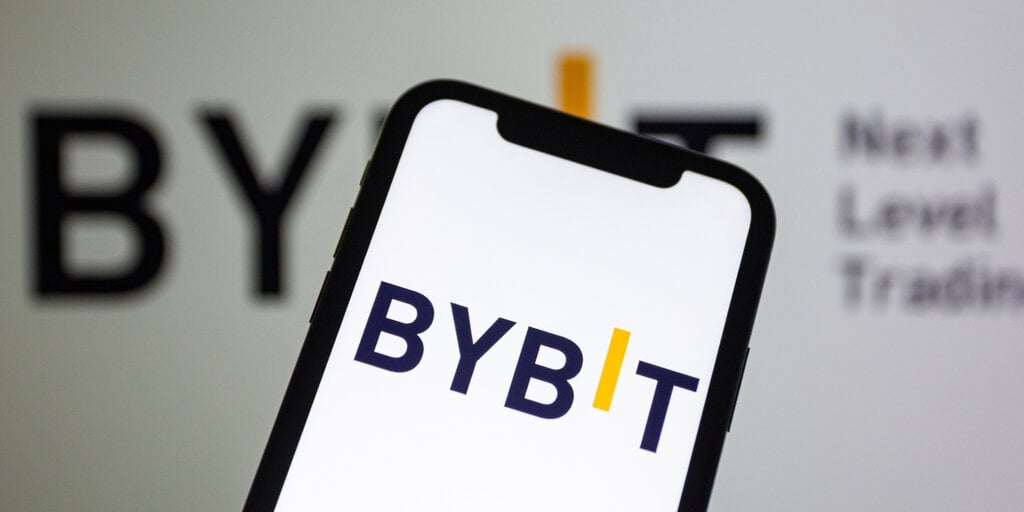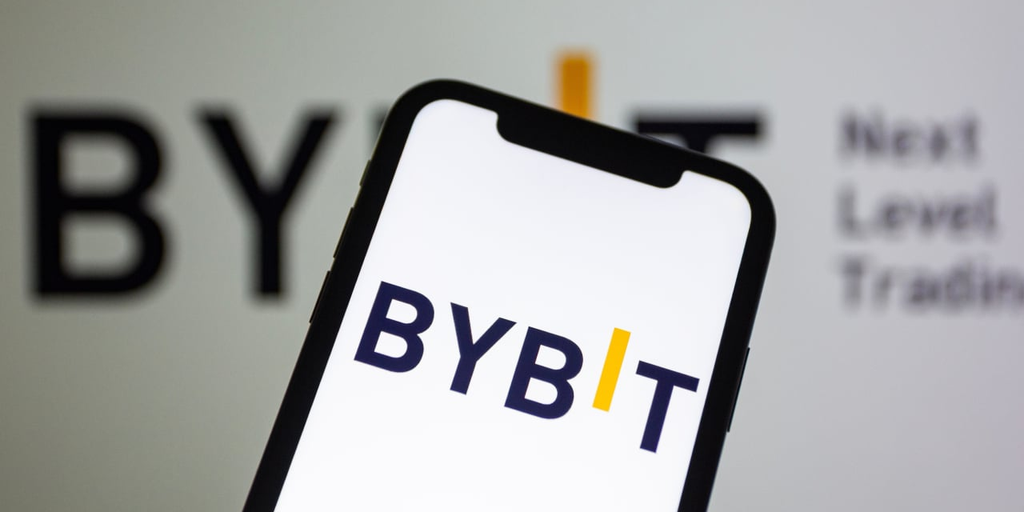Coins
Bybit Funds on the Move, Could be Headed for Bitcoin Mixers ‘Next’: Elliptic
Published
1 month agoon
By
admin

North Korean hackers have started laundering stolen Bybit funds, with blockchain intelligence firm Elliptic tracking over $140 million in initial transactions designed to obscure the money trail.
The stolen funds are being systematically moved through anonymous exchanges before being converted to Bitcoin, a process that makes it harder to trace and recover the assets, the firm wrote in a blog post on Saturday.
“The second step of the laundering process is to ‘layer’ the stolen funds in order to attempt to conceal the transaction trail,” Elliptic wrote. “This transaction trail can be followed, but these layering tactics can complicate the tracing process, buying the launderers valuable time to cash out the assets.”
The $1.46 billion social engineering attack, which took place on Friday and consisted mostly of Ethereum, is the most significant theft in crypto history, surpassing the $611 million stolen from Poly Network in 2021.
Elliptic and Arkham Intelligence have linked the attack to North Korea’s Lazarus Group, citing the use of decentralized exchanges and other services, including cross-chain bridges and coin swap services in a bid to throw off the scent.
“If previous laundering patterns are followed, we might expect to see the use of mixers next to further obfuscate the transaction trail,” it said. However, that may prove challenging due to the “sheer volume of stolen assets.”
Within hours of the theft, attackers distributed the stolen assets across 50 different wallets, each holding approximately 10,000 ETH. The funds are now being systematically emptied and converted to Bitcoin, according to Elliptic.
The attackers first converted stolen tokens like stETH and cmETH to Ethereum using decentralized exchanges, likely to avoid potential asset freezes.
This matches Lazarus Group’s typical laundering playbook of converting stolen tokens to “native” blockchain assets before further obfuscation, Elliptic wrote.
To date, the group has stolen over $3 billion in crypto assets since 2017, reportedly funding North Korea’s ballistic missile program with the proceeds, according to a UN report last year, though that figure is suspected to be much higher, Elliptic noted.
As a result of the theft on Sunday, Bybit is now facing pressure from users’ withdrawals, who have since pulled roughly 23,000 BTC from Bybit’s hot wallet, data from Arkham Intelligence shows.
The exchange’s main wallets show its Bitcoin balance has dropped from 70,000 BTC to just over 52,000 BTC, indicating an outflow of roughly $1.7 billion since Friday afternoon.
Further analysis suggests Bybit has seen outflows totaling $6 billion across various crypto.
Anonymous crypto exchange blamed
Elliptic and others, including ZachXBT, have also pointed to anonymous crypto exchange eXch as having processed “tens of millions of dollars” in stolen assets from the hack despite direct requests from Bybit to block the activity.
“The stolen Ethereum is steadily being converted to Bitcoin, using eXch and other services,” Elliptic wrote Sunday.
A purported emailed response from eXch, archived on X on Saturday and cited by Elliptic, alleges the crypto exchange chose not to acknowledge requests from Bybit, claiming the latter has made “direct attacks on the reputation” against the former in the past.
“It is difficult for us to understand the expectation of collaboration” from an organization that has “actively undermined our reputation,” the email from eXch reads.
The exchange did not immediately respond to Decrypt’s request for comment.
In a post to a Bitcoin forum on Sunday, eXch claimed allegations it was facilitating money laundering were untrue.
“We are not laundering money for Lazarus/DPRK,” eXch wrote, claiming that such an allegation was the “perspective of some people that wish decentralized coins’ fungibility and on-chain privacy to vanish.”
It added: “The insignificant part of funds that was processed by us from the Bybit hack in an isolated case will be donated to various open-source initiatives dedicated to privacy and security both inside and outside crypto space.”
Edited by Sebastian Sinclair
Daily Debrief Newsletter
Start every day with the top news stories right now, plus original features, a podcast, videos and more.
Source link
You may like


$90K Breakout Ahead as BTC Decouples from US stocks after China’s Tariffs


Toncoin Takes A Hit With 12% Correction After Failing To Break $4.34, More Pain?


Bitcoin sentiment falls to 2023 low, but ‘risk on’ environment may emerge to spark BTC price rally


Crypto Trader Says Dogecoin Is at a Critical ‘Make-or-Break’ Level, Updates Outlook on Solana and Avalanche


Bitcoin Covenants: CHECKSIGFROMSTACK (BIP 348)


Illinois State Senator’s Bill Seeks to Claw Back $163 Million Lost to Crypto Fraud
Coins
Bitcoin Staking Protocol Babylon Reveals BABY Token Airdrop
Published
22 hours agoon
April 3, 2025By
admin

The Babylon Foundation, an entity tied to the Bitcoin staking protocol Babylon, released tokenomic details for its BABY token Thursday—and revealed an airdrop for early users.
The Foundation will provide 6% or 600 million BABY, the Babylon Genesis Network’s native governance token, to five reward groups and early supporters as part of its airdrop. The vast majority of tokens (585 million) set aside for the airdrop campaign will be provided to those who have staked Bitcoin with Babylon.
“Tokens will be directly transferred to the registered BABY address upon Babylon Genesis launch,” the Babylon Foundation posted on X (formerly Twitter). “No claims needed.”
The Early Adopters Airdrop (6% of supply) comprises 5 categories:
30M BABY – Staking participation, every Phase-1 stake is eligible
335M BABY – Base Phase-1 staking rewards
200M BABY – Bonus for Phase 1 stakes that will transition to Phase 2
30M BABY – Pioneer Pass NFT…
— Babylon Foundation (@bbn_foundation) April 3, 2025
The largest allocation, 335 million BABY tokens, is for those who participated in Babylon’s Base Phase-1 staking, the locking up of native Bitcoin tokens via Babylon which took place across multiple instances called “caps.”
The protocol launched three total caps of Bitcoin staking, the first of which was held to just 1,000 Bitcoin and led to a major spike in transaction fees as users rushed to be among the first to stake their Bitcoin ahead of anticipated rewards.
Another 200 million BABY is earmarked for users that transition their Phase-1 stakes to Phase-2. Two smaller buckets—of 30 million and 5 million BABY, respectively—will be provided to Pioneer Pass NFT holders and Github contributors.
BABY was first revealed in February, and users were able to create and register a BABY address and connect it to their Bitcoin staking wallet. At the launch of the Babylon Genesis Network, users will automatically receive their airdropped BABY tokens.
Users who have participated in Babylon staking, but have not registered their address, can still do so if they transition their stakes to Phase-2. Other social and wallet campaign airdrops for BABY are also planned by the Foundation.
Babylon Genesis is a layer-1 proof-of-stake blockchain that is secured by Bitcoin, meaning it uses Bitcoin staking to secure and provide liquidity to the network. The network will utilize a “dual-staking” model, allowing users to stake both BTC and BABY tokens.
Babylon previously raised more than $70 million to make Bitcoin the “backbone of proof-of-stake systems”—in other words, making it possible to use the leading crypto asset to help secure proof-of-stake chains like Ethereum or Solana.
Edited by Andrew Hayward
Daily Debrief Newsletter
Start every day with the top news stories right now, plus original features, a podcast, videos and more.
Source link
Coins
Alabama, Minnesota Advance Bitcoin Reserve Plans With Companion Bills
Published
2 days agoon
April 2, 2025By
admin

Bitcoin could soon find a place on state balance sheets, with Alabama and Minnesota both pressing ahead with legislative frameworks for state Bitcoin reserves.
In Minnesota, House File 2946, also called the Minnesota Bitcoin Act, introduced by Rep. B. Olson (R-MN) on Tuesday, would allow the state to invest in Bitcoin directly. Its Senate counterpart, SF 2661, was introduced earlier in March.
The identical bills seek to authorize the State Board of Investment to allocate public funds into Bitcoin, marking a direct acknowledgment of the digital asset’s long-term financial potential.
Meanwhile in Alabama, Senate Bill 283, filed this week by Sen. April Weaver (R-AL)is a companion to House Bill 482, introduced earlier in March.
Though neither bill explicitly names Bitcoin, the legislation limits eligibility to digital assets with a market capitalization of at least $750 billion.
Currently, only Bitcoin meets that threshold, effectively making it the sole qualifying asset under the proposed framework.
If the proposals pass, they would take effect on October 1, 2025 in Alabama and January 1, 2026 in Minnesota.
Both states are embracing a legislative tactic commonly used to fast-track approval: introducing identical bills in both chambers.
HF 2946/SF 2661 would allow the state to not only invest in Bitcoin but also accept it for tax payments and government transactions.
The bill amends more than a dozen statutes to incorporate crypto, including tax codes, pension plans, and investment rules.
The Alabama legislation also outlines digital assets must be held directly by the treasurer, by a qualified custodian, or via exchange-traded products, and cannot exceed 10% of any state fund.
U.S. state Bitcoin reserve proposals
The proposals follow a wider trend of state-level efforts across the U.S. to explore the world’s largest crypto as a strategic reserve asset.
While some states, including Wyoming, Montana, and Pennsylvania, have recently paused or withdrawn their Bitcoin reserve plans, the momentum remains strong elsewhere.
South Carolina recently introduced a bill to allow its treasurer to allocate up to 10% of certain state funds into digital assets—starting with Bitcoin.
Oklahoma’s House Bill 1203, which allows for crypto asset reserves, passed overwhelmingly and is pending Senate review. Texas passed Senate Bill 21 to establish a Bitcoin strategic reserve and is awaiting gubernatorial approval.
Arizona and Utah have introduced their own frameworks, although Utah’s reserve language was dropped during revisions.
Bitcoin reserve tracker Bitcoin Law’s data shows that 47 state-level Bitcoin reserve bills have been introduced in 26 states, 41 of which are currently live.
Sentiment around the passing of a state Bitcoin reserve proposal appears to have turned negative, however. Users of MYRIAD, the decentralized prediction market launched by Decrypt’s parent company DASTAN, overwhelmingly predicted that no state would implement such a reserve, in a market that closed at the end of March.
Daily Debrief Newsletter
Start every day with the top news stories right now, plus original features, a podcast, videos and more.
Source link
Coins
There’s More to North Korea’s Hacking Ops Than Just Lazarus Group: Paradigm
Published
4 days agoon
April 1, 2025By
admin

In February, North Korean hackers broke headlines with what is now regarded as the largest single hack in crypto history.
The Lazarus Group stole at least $1.4 billion from Bybit and later funneled those funds to crypto mixers.
“Someone had pulled off the biggest hack in [crypto] history, and we had a front-row seat,” Samczsun, Research Partner at Paradigm, recalled in a blog post.
The researcher said they witnessed the theft in real-time and collaborated with Bybit to confirm the unauthorized access.
Samczsun was working with SEAL 911, an emergency response unit affiliated with the Security Alliance, a nonprofit organization dedicated to securing decentralized systems.
But these attacks aren’t all just about the Lazarus Group. There’s more to North Korea’s cyber offensives than previously thought.
There’s a misconception about how to “classify and name” the group’s operations.
While the term “Lazarus Group” is “colloquially acceptable,” discussing how the DPRK (Democratic People’s Republic of Korea) runs its cyber operations on the offensive needs more rigor, Samczsun claimed.
Lazarus Group has become the preferred term by the media when describing DPRK cyberactivity. Cybersecurity researchers “created more precise designations” to show which ones are working on specific activities, they added.
A hacking bureau
The DPRK’s hacking ecosystem operates under the Reconnaissance General Bureau (RGB), which houses several distinct groups: AppleJeus, APT38, DangerousPassword, and TraderTraito
These groups operate with specific targeting methodologies and technical capabilities.
TraderTraitor, identified as the most sophisticated DPRK actor targeting the crypto industry, focuses on exchanges with large reserves and employs advanced techniques, successfully compromising Axie Infinity through fake job offers and manipulating WazirX.
AppleJeus specializes in complex supply chain attacks, including the 2023 3CX hack that potentially affected 12 million users.
Dangerous Password, meanwhile, conducts lower-end social engineering through phishing emails and malicious messaging on platforms like Telegram.
Another subgroup, APT38, spun out of Lazarus in 2016 and focused on financial crimes. It first targeted traditional banks before shifting attention to crypto platforms.
In 2018, the OFAC first mentioned “North Korean IT workers,” which in 2023 were identified by researchers as “Contagious Interview” and “Wagemole,” operating through schemes where the threat actors either pose as recruiters or attempt to get hired by target companies.
There’s still hope
While the DPRK has shown its ability to deploy zero-day attacks, there have been “no recorded or known incidents” of it deploying directly against the crypto industry, Samczsun said.
The researcher urged crypto companies to implement basic security practices such as least privilege access, two-factor authentication, and device segregation. If preventive measures fail, connecting with security groups like SEAL 911 and the FBI’s DPRK unit would also be helpful.
“DPRK hackers are an ever-growing threat against our industry, and we can’t defeat an enemy that we don’t know or understand,” Samczsun wrote.
Edited by Sebastian Sinclair
Daily Debrief Newsletter
Start every day with the top news stories right now, plus original features, a podcast, videos and more.
Source link
Circle’s IPO Filing Tests Crypto Market Confidence After Trump’s Tariff Shock

$90K Breakout Ahead as BTC Decouples from US stocks after China’s Tariffs

Toncoin Takes A Hit With 12% Correction After Failing To Break $4.34, More Pain?

Bitcoin sentiment falls to 2023 low, but ‘risk on’ environment may emerge to spark BTC price rally

Crypto Trader Says Dogecoin Is at a Critical ‘Make-or-Break’ Level, Updates Outlook on Solana and Avalanche

Bitcoin Covenants: CHECKSIGFROMSTACK (BIP 348)

Illinois State Senator’s Bill Seeks to Claw Back $163 Million Lost to Crypto Fraud

Here’s why Bitcoin, altcoins, and the stock market continued falling on Friday

Bitcoin Falls Back to $83K, XRP, SOL, DOGE Surrender Gains as China Announces 34% Tariffs on All U.S. Goods

BTC Holds $84K, ATOM & FIL Become Top Gainers

Analysts Eye 20% Breakout If This Level Is Reclaimed

AI and blockchain — A match made in heaven

‘We’re Still in Danger Territory’: Crypto Analyst Unveils Bearish Setup for Bitcoin – Here Are His Targets

Bitcoin Startups Raised Nearly $1.2 Billion

Illinois to End Lawsuit Against Coinbase Over Staking Program: Report

Arthur Hayes, Murad’s Prediction For Meme Coins, AI & DeFi Coins For 2025

Expert Sees Bitcoin Dipping To $50K While Bullish Signs Persist

Aptos Leverages Chainlink To Enhance Scalability and Data Access

Bitcoin Could Rally to $80,000 on the Eve of US Elections

Sonic Now ‘Golden Standard’ of Layer-2s After Scaling Transactions to 16,000+ per Second, Says Andre Cronje

Institutional Investors Go All In on Crypto as 57% Plan to Boost Allocations as Bull Run Heats Up, Sygnum Survey Reveals

Crypto’s Big Trump Gamble Is Risky

Ripple-SEC Case Ends, But These 3 Rivals Could Jump 500x

Has The Bitcoin Price Already Peaked?

A16z-backed Espresso announces mainnet launch of core product

Xmas Altcoin Rally Insights by BNM Agent I

Blockchain groups challenge new broker reporting rule

The Future of Bitcoin: Scaling, Institutional Adoption, and Strategic Reserves with Rich Rines

Trump’s Coin Is About As Revolutionary As OneCoin

Is $200,000 a Realistic Bitcoin Price Target for This Cycle?
Trending

 24/7 Cryptocurrency News5 months ago
24/7 Cryptocurrency News5 months agoArthur Hayes, Murad’s Prediction For Meme Coins, AI & DeFi Coins For 2025

 Bitcoin3 months ago
Bitcoin3 months agoExpert Sees Bitcoin Dipping To $50K While Bullish Signs Persist

 24/7 Cryptocurrency News3 months ago
24/7 Cryptocurrency News3 months agoAptos Leverages Chainlink To Enhance Scalability and Data Access

 Bitcoin5 months ago
Bitcoin5 months agoBitcoin Could Rally to $80,000 on the Eve of US Elections

 Altcoins2 months ago
Altcoins2 months agoSonic Now ‘Golden Standard’ of Layer-2s After Scaling Transactions to 16,000+ per Second, Says Andre Cronje

 Bitcoin5 months ago
Bitcoin5 months agoInstitutional Investors Go All In on Crypto as 57% Plan to Boost Allocations as Bull Run Heats Up, Sygnum Survey Reveals

 Opinion5 months ago
Opinion5 months agoCrypto’s Big Trump Gamble Is Risky

 Price analysis5 months ago
Price analysis5 months agoRipple-SEC Case Ends, But These 3 Rivals Could Jump 500x


